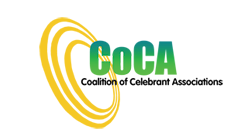Essential knowledge:
The candidate must be able to demonstrate essential knowledge required to effectively do the task outlined in elements and performance criteria of this unit, manage the task and manage contingencies in the context of the identified work role
These include:
- Awareness of the history of ritual and ceremony, including both religious and secular focus
- Function and importance of ritual (ceremony/ group support) and story telling times of change, and in particular human life stages from birth to death
- Broad understanding of the role of the celebrant in Australian culture in 21st century
- Structure and function of ceremony and role of celebrant
- The public role and legal importance of different kinds of ceremony
- Recognition of range of ritual and ceremonial expression across different cultures
- Understanding of how ceremonies signpost a culture
- Benefits of ceremony and ritual to society
- Art and craft in the delivery of ceremony
- Broad knowledge of stages of human development and psychology of change
- Understanding of importance in relation to celebrancy of:
- client centred focus
- ethical and moral issues
- distinctions between religious and civil ceremony content i.e. Church vs State issues
- Legal and practical information, such as:
- Awareness of Commonwealth, State and Territory discrimination laws
- Detailed knowledge of responsibilities in accepting a statutory declaration (Statutory Declarations Act 1959)
- Copyright Act (1968) especially applicability of the use of material in ceremonies
- Understanding that celebrants have an obligation to protect privacy and maintain confidentiality (Privacy Act 1988)
- Understanding of obligations relevant to operating as a celebrant within the Trade Practices Act (Trade Practices Act 1974)
- Understanding and awareness of cultural rights, multicultural contributions, and the place of the arts in culture and ceremony
- Understanding of and committed attitude to ongoing professional development
- Conflict of interest issues in a celebrancy role
- Resources and associated costs required to establish, support and maintain a celebrancy service/home based small business, including:
- insurance (public liability, professional indemnity, accident and other)
- professional association membership
- professional development
- Current knowledge of WHS issues and management of potential emergency situations as they apply to the celebrancy work role and range of work environments, including:
- legal requirements relating to WHS
- basic hazard identification procedures such as venue/environmental inspections and review of associated safety information and procedures
- principles of basic risk assessment
- hierarchy of control and its application in risk management
- processes for raising WHS issues, reporting hazards, incidents and injuries and WHS issue resolution
- potential emergency situations, alarms and signals and appropriate response
Essential knowledge:
The candidate must be able to demonstrate essential knowledge required to effectively do the task outlined in elements and performance criteria of this unit, manage the task and manage contingencies in the context of the identified work role
These include knowledge of:
- Relevant legislative and statutory requirements and provisions relating to provision of celebrancy services
- Standards and code of ethics relevant to celebrancy
- Stages of human development and broad knowledge of psychology of change as a basis for determining specific nature of client requirements
- Recognition of range of ritual and ceremonial expression across different cultures
- Understanding of importance in relation to celebrancy of:
- client-centred focus
- ethical and moral issues
- distinctions between religious and civil ceremony content i.e. Church vs State issues
- Understanding and awareness of cultural rights, multicultural contributions, and the place of the arts in culture and ceremony


